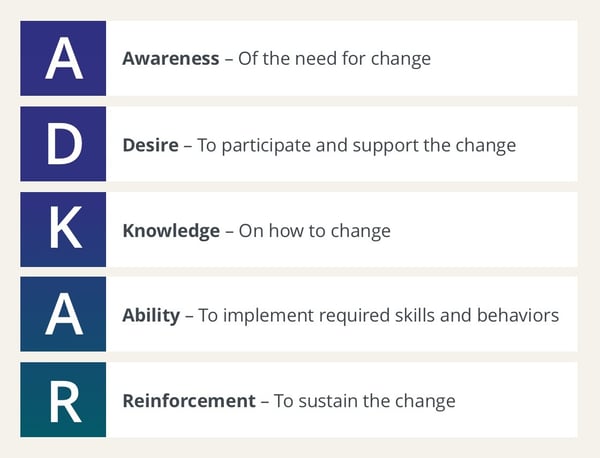Change Management in Healthcare
- Change Management in Healthcare
- The Role of Change Management in Healthcare
- The Importance of Change Management in Healthcare
- Key Drivers of Change in the Healthcare Sector
- Why Change Management in Healthcare is Crucial
- Common Challenges in Healthcare Change Management
- The Prosci Approach to Healthcare Change
- Tailoring Strategies to Healthcare's Specific Ecosystem
- Innovative Solutions for Change Management in Healthcare
- Engaging diverse stakeholder groups
- Seamless technology integration
- Continuous training and support
- Measuring and communicating the impact of change
- Surprising Insights in Healthcare Change Management
- The untapped potential of positive change
- Overlooked benefits of people and patient engagement
- How small changes can yield significant improvements
- Real-World Application and Success Story
Change Management in Healthcare
Incorporate change management in healthcare to deliver results like maintaining over 90% employee motivation to participate in change initiatives even through many setbacks.
This guide explores the Prosci Methodology, highlighting its efficacy in elevating patient care, ensuring regulatory compliance, and enhancing operational efficiency. Prosci offers tailored strategies for the healthcare sector, with an emphasis on overcoming resistance to change and embedding new ways of working.
Discover how healthcare transformations improve patient outcomes and provide a resilient, patient-focused system to improve engagement and morale.
The Role of Change Management in Healthcare
Change management is like preventative medicine. It paves the way to smoothly integrate new practices and technologies, and adhere to regulations. Change management helps healthcare departments to collaborate and team members to engage, which prevents future issues, unnecessary delays and added costs.
In healthcare, a common large-scale change project is to implement an electronic health records solution. While much attention is often given to the technical solution, the more impactful change is on those learning to work in new ways while continuing to comply with patient privacy and avoiding disruptions to patient care.
The Prosci approach guides healthcare teams through each stage of these complex transitions, from building awareness of the need for change through to sustaining the new ways of working. It embeds a team-based approach starting with empowering leaders to keep tight alignment with healthcare strategies and visibly supporting the change within their teams. The team approach encompasses the people leaders, project managers, and the change management practitioners. The Prosci ADKAR Model shows the journey from announcing a change through to adoption and sustainment.
The Importance of Change Management in Healthcare
Change in healthcare is a continuous improvement journey, not just a one-time event. A common misconception is that the work is done once a new system or process is implemented.
The Prosci Methodology is highlighted in various healthcare articles as an ideal fit for this sector's dynamic nature. It demands constant evaluation and adaptation to emerging technologies, advances in patient treatments, evolving regulations, and shifting patient needs.
Subscribe to our bi-weekly blog to receive articles that help you, your team and your organization grow stronger from change.
Key Drivers of Change in the Healthcare Sector
.png?width=600&height=426&name=Healthcare%20Industry%20Key%20Drivers%20of%20Change%20Wheel%20(3).png)
Healthcare is evolving quickly due to many major influences that are changing how it provides care and operates.
- Demographic changes – The aging population and evolving healthcare needs require the healthcare sector to adapt to diverse health conditions and growing demand.
- Rising costs – Escalating medical care and technology costs exert pressure on healthcare organizations to manage finances effectively without compromising quality care.
- Labor shortages – Shortages of healthcare workers, ranging from nurses to specialists, demand innovative solutions to ensure continued access to medical care.
- Increasing competition – Hospitals and clinics amid growing healthcare options, strive to differentiate themselves by enhancing services and patient experiences.
- Declining reimbursement – Shifts in insurance reimbursements and government funding in public healthcare may financially strain providers, prompting a need for cost-effective service models.
- Healthcare worker burnout – Prioritizing staff well-being is crucial to prevent burnout, ensuring high-quality patient services and efficient operations.
- Role of technology – Technologies like virtual care revolutionize healthcare delivery, enhancing accessibility and efficiency.
Prosci offers a clear plan for managing change, concentrating on both practical and people aspects. This helps healthcare organizations adjust smoothly and succeed in a constantly evolving environment.
Why Change Management in Healthcare is Crucial
The importance of change management in healthcare becomes clear when considering real-world scenarios.
The Texas Children's Hospital case study illustrates the value of change management in a major healthcare initiative. It’s one of many examples that show how leadership support and user engagement are vital in major healthcare initiatives. In this case, an electronic medical record (EMR) system was implemented across multiple business units with a measurable downgrade in results when change management activities were less supported for one team. It showcased the clear advantages of applying a structured change management approach.
Successfully navigating change in healthcare is inherently challenging due to its unique dynamics. These dynamics encompass:
- Adapting to technological advancements – Integrating the latest healthcare technologies in a manageable way for staff is crucial to prevent change fatigue. This ensures that new tools enhance the delivery of quality clinical care.
- Ensuring regulatory compliance – Compliance with healthcare regulations is non-negotiable for patient safety. Regularly updating practices to meet legal and ethical standards is essential.
- Improving patient care and outcomes – Adopting advanced treatments and technologies enhances the quality of medical treatments, leading to better health results.
- Enhancing operational efficiency – Optimizing healthcare processes and systems is vital to reduce costs and improve service delivery. Operational efficiency directly contributes to better patient support and resource management.
- Managing risks and facilitating collaboration – Effective change management mitigates risk and ensures patient and staff safety. Collaboration among healthcare professionals fosters teamwork, which is essential for comprehensive patient treatment.
- Cultivating continuous improvement and attracting talent – A culture of continuous improvement encourages innovation and growth. Attracting and retaining skilled healthcare professionals is vital for maintaining high standards for patient care.
- Navigating demographics and policy shifts – Adapting to changing patient demographics and healthcare policies is necessary to keep healthcare relevant and effective. This involves understanding and responding to the diverse needs of different patient groups.
In healthcare, managing change well is a preventive measure that protects the quality of care, ensures compliance and strengthens organizational health.
Common Challenges in Healthcare Change Management

Embracing a proactive approach to change management maintains clinician motivation and focus in healthcare, especially when facing unexpected challenges.
The University of Virginia incorporated the Prosci change management model to focus more on the people side of change, bring change management capability into its organization, and more.
Predominant themes in healthcare change management include:
- Regulatory compliance challenges – Staying up-to-date with ever-changing healthcare laws is complex. Regular reviews, updates and compliance audits are necessary to navigate legal complexities and avoid potential violations.
- Complex structural navigation – Healthcare systems are often siloed and complicated, making inter-departmental communication a significant hurdle. Implementing strategies for cross-departmental collaboration and using unified platforms can help break down these barriers.
- Technology integration issues – Introducing new technologies can disrupt daily operations. Planning gradual rollouts, conducting pilot tests, and offering targeted staff training are essential steps to minimize operational impact.
- Managing medical staff – Change can lead to decreased morale, change fatigue, burnout and staff turnover. Addressing these issues requires robust support programs, transparent communication, and initiatives to enhance staff resilience.
- Stakeholder-needs balance – As explored in numerous change management articles in healthcare, the diverse needs and concerns of patients, clinicians and administration present a balancing act. Regular feedback sessions are vital to understand these diverse perspectives and adjust strategies accordingly.
- Cultural resistance to change – This challenge highlights the importance of change management in healthcare. Adapting to a culture that embraces change is challenging, especially in the face of resistance. Leadership modeling and engagement initiatives are vital to fostering a receptive environment and highlighting the benefits of new practices.
- Training and support hurdles – Keeping staff updated with new processes demands comprehensive training and ongoing support. Setting up dedicated training sessions and support networks like helpdesks addresses the challenge of keeping staff well-informed and assisted.
- Patient management adjustments – Changes can adversely affect patient services. Constantly monitoring their impact through surveys and quality control, and adjusting strategies based on feedback, ensures that patient support remains uncompromised.
Understanding and preparing for these factors enables healthcare organizations to navigate changes effectively.
The Prosci Methodology helps healthcare organizations effectively address these challenges. This structured approach to change management helps to minimize medical service disruptions and keep staff morale high through thoughtful engagement.
The Prosci Approach to Healthcare Change
The Prosci Methodology is used worldwide for healthcare change management. After undergoing a significant update in 2021, the more actionable and accessible methodology comprises three core components:
The Prosci Change Triangle (PCT) Model – It highlights how four key elements are interconnected and vital for successful change efforts. These are Success, Leadership/Sponsorship, Project Management and Change Management. The PCT Model gives a point-in-time assessment of the health of a project by looking at these four interconnected elements, and provides a means to measure project health throughout the duration of the initiative.
Prosci ADKAR Model – This model outlines five essential building blocks for individual change: Awareness, Desire, Knowledge, Ability and Reinforcement. At its core, the Prosci ADKAR Model shows that the success of organizational change is dependent on individual people changing. The model also demonstrates the journey every person experiences over the course of a change. It offers a framework for planning, a means to measure progress and a way to see where people are stuck so plans can be adapted.
The Prosci ADKAR Model
Prosci 3-Phase Process – This provides a structured yet scalable approach to implementing organizational change. The phases are:
- Phase 1 – Prepare Approach – This phase supports change and project teams in developing a change management strategy. The three stages include: Define Success, Define Impact and Define Approach.
- Phase 2 – Manage Change – The second phase brings the Change Management Strategy to life and involves developing plans and actions. The three stages of this phase include: Plan and Act, Track Performance, and Adapt Actions.
- Phase 3 – Sustain Outcomes – The final phase ensures that change is adopted and that the organization sustains the change. The three stages include: Review Performance, Active Sustainment and Transfer Ownership.
This structured process gives a framework for complex healthcare-based changes to transition from the concept to achieving the expected outcomes.
Discover more about the ADKAR Model in this video featuring Tim Creasey, and learn about the full scope of the Prosci Methodology.
Tailoring Strategies to Healthcare's Specific Ecosystem
In healthcare, change initiatives require tailored strategies to address unique challenges like patient safety and regulatory compliance. Healthcare leaders who advocate for change management are seeing success. As Prosci research shows, organizations that implement excellent change management are seven times more likely to meet or exceed their objectives.
The Prosci approach balances empathy and decision-making, equally valuing medical staff concerns and decisive actions to uphold patient safety and care quality. It ensures healthcare organizations can effectively and compassionately navigate the complexities of change—leading to improved outcomes and enhanced operational efficiency.
Innovative Solutions for Change Management in Healthcare

Healthcare transformation requires innovative solutions, and the Prosci approach meets these unique challenges with practicality and impact.
Engaging diverse stakeholder groups
Engaging stakeholder groups is necessary and a key aspect of change management. These town hall meetings ensure that people are aware of the changes and the business need for the change. This approach gathers diverse input, ensuring change management suits different departmental needs and encourages widespread support.
Seamless technology integration
Consider a scenario where a healthcare facility introduces a new electronic health records or electronic health records (EHR) system. The project management or solutions development team would implement the technology and processes in collaboration with the change management team. Initially, a pilot program might be run in one department, followed by gradual expansion. This approach allows for addressing initial problems without disrupting clinical care and ensuring staff adapts comfortably to the new system.
Continuous training and support
To achieve success in change management, you need to measure the progress. We suggest applying three levels of performance metrics—organizational performance, individual performance, and change management performance—for a holistic framework for measuring overall performance.
Measuring and communicating the impact of change
Our approach includes encouraging project sponsors and the project team to define success criteria early and help them understand how change will impact individuals and groups. This enables us to implement measurement tactics early in the process and reduce the number of metrics to a trackable few.
Surprising Insights in Healthcare Change Management
 Healthcare change management reveals surprising insights, emphasizing the benefits of positive change, employee and patient engagement, and the impact of small changes.
Healthcare change management reveals surprising insights, emphasizing the benefits of positive change, employee and patient engagement, and the impact of small changes.
The untapped potential of positive change
Positive change in healthcare, such as adopting digital records, transforms medical staff attitudes and increases operational efficiency. Our change management model teaches your team a better understanding as to why the change is happening in the first place to keep all parties engaged in the healthcare practice during disruptive change.
Overlooked benefits of people and patient engagement
Engaged employees and volunteers in healthcare, especially nurses, tend to make fewer errors, directly improving patient outcomes. Engaged patients report higher satisfaction with their care and generally have better health outcomes.
Feedback from employees and patients is a crucial tool for improvement, leading to significant enhancements in patient care services.
How small changes can yield significant improvements
Small adjustments in healthcare settings can make a difference, such as reorganizing supply rooms or implementing color-coded patient files. But getting your team to adopt this new change can be the issue. Thankfully, the Prosci change management model encourages people to engage, adopt, and use new strategies to perform their work differently.
Real-World Application and Success Story
Prosci has a healthcare system success story that exemplifies the effectiveness of systematic change techniques in healthcare.
This real-world application showcases how change management not only aids in significant initiatives like opening new hospitals but also sets a benchmark for future projects.
Transformative change in an academic health system merger
Delving into the details of this transformative project, let's explore the background and challenges faced by a large-scale healthcare merger.
Background and challenge:
A Chicago-based health system embarked on an ambitious project to integrate two new organizations. This expansion was part of a broader growth strategy, significantly focusing on implementing an Enterprise Resource Planning (ERP) system across its expanded network.
The challenge was to manage this complex integration while ensuring uninterrupted, quality medical treatment.
TESTIMONIAL
⭐⭐⭐⭐⭐
"The research foundation of Prosci provided credibility for change management at our organization. It made it easier to get our senior team and project members on board. The methodology is simple and flexible, and the research is so accessible that we can make the most informed decisions for our organizations."
— Director of Human Services
Solution and implementation:
The solution to merge two large healthcare systems involved embracing the Prosci change management methodology. Key steps included:
- Participating in Prosci ECM Boot Camp for strategic planning.
- Certifying change practitioners in the Prosci Methodology.
- Engaging and educating project sponsors.
- Implementing the Prosci 3-Phase Process for clear project expectations and execution.
- Leveraging Prosci Best Practices research to strengthen change management planning.
The strategic steps in this merger streamlined the integration process and amplified the project's impact. This success set the stage for a deeper collaboration, as detailed in the next section.
Partnership with Prosci:
The methodology's research-based foundation influenced the decision to partner with Prosci, offering a structured yet flexible approach to change management.
Application and results:
The application focused on effective sponsorship, project sizing and scoping, and crafting comprehensive change management plans. The results were immediate, marked by high engagement and awareness at the integration's onset.
Organizational outcomes:
The successful integration led to several key outcomes:
- Effective adoption of the ERP system by the new organizations.
- Development of a repeatable method for managing the people side of integrations.
- Increased employee engagement and enhanced change management maturity across departments.
The Chicago-based healthcare merger demonstrates the effectiveness of structured change management in healthcare. Our methodologies successfully integrated new organizations into the health system, setting a precedent for future changes.
Healthcare Changes Done Right With Support From Prosci
Managing changes in healthcare requires experienced change leaders who know your unique industry and challenges. Contact Prosci today to learn how we can partner with you to expand and strengthen your capacity for change.
GET STARTED